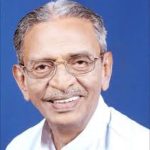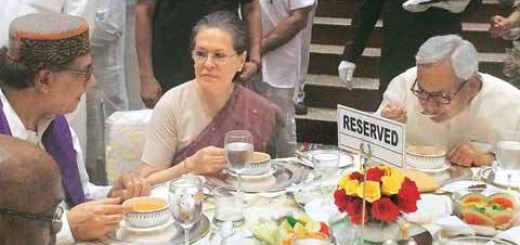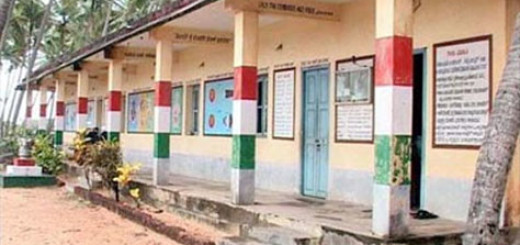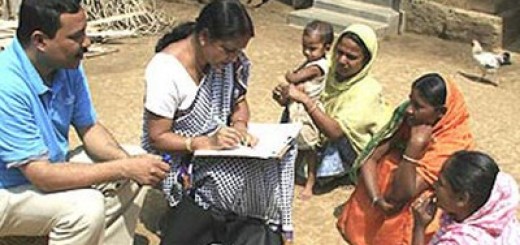CBI raid on NDTV – a reflection – Litmus test for desi media!
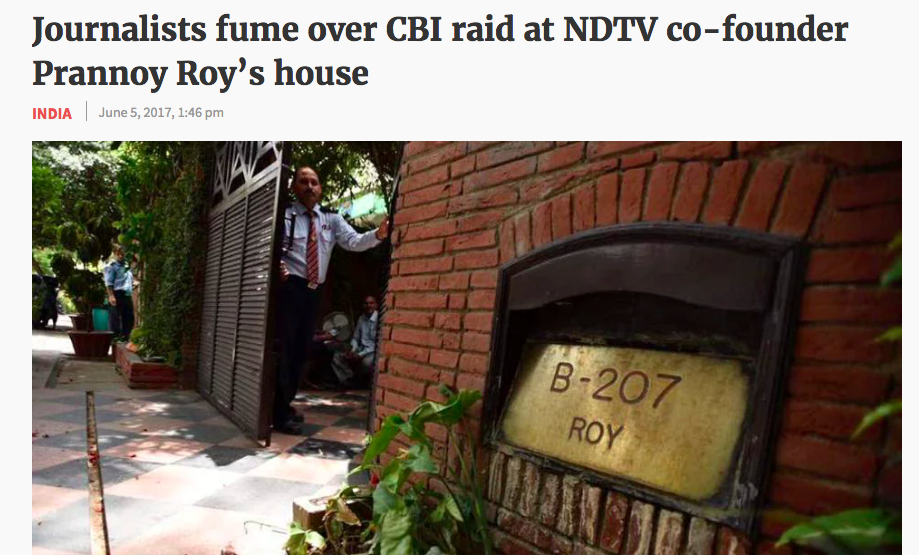
- Prannoy Roy, it is generally held, is a highly respected, reputed and well-regarded television anchor and co-founder of NDTV. He is also recipient of the prestigious Lal Bahadur Shastri National Award for Excellence in Public Administration, Academics and Management. Yet the CBI (or government) sees his channel biased, while the channel sees the actions of the CBI a witchhunt! Who is right?
It is not only NDTV but the press council of India and the whole fraternity in the publication field, noted critics and even a foreign world-watch like HUFFPOST see it as an instance of witchhunt. That being the case, are we today back in the emergency days? We were tempted to think so while listening to the famous writer and critic Arun Shourie, editor of Indian Express in Emergency days.
In any case we highly recommend the very balanced article of Sandiff Roy, given below, which tells too many things without telling, that is, helps the reader, to make his/her own conclusion.
In fact why do so many outspoken journalists and wellknown Anchors like Burkha Dutt, Rajdeep Sardesai, Sagarika Gosh, Arnab Goswamy fall off from their pedestals one after another or take leave from their acclaimed posts during the present BJP dispensation at the centre? Smoked out on various pretexts? If so by whom? Not that we agree with the views of all these anchors! We do not. We differ on many of their views without refusing to see things from their angle.
Yes, competition in the marketplace of ideas, even cut-throat competition which does not chop off heads, is the essence of the freedom of the press. For that to happen governments should provide equal opportunities for conflicting ideas to appear freely in public, and not put new road blocks or traps like sedition and liable laws to stop critics from opening their mouths or writers from taking up their pen.
It must be admitted without any doubt that Modi government out-shines all previous ones for two things: 1. Noval ideas as well as eye-catching and intoxicating slogans. 2. Equally it stands out for advertising, not publicity.
Advertising
Advertising is an exaggerated and sugar coated presentation with a hook or venom within which kills the consumer. Recall ever so many exciting, intoxicating and eye-popping slogans like ‘swatch Bharath’, often with Modi himself dressed in Suit-coat, sweeping streets to draw sympathy, admiration and instant belief.
To cite few more: ‘sab ka vikas sub ka sat’ and recall the on going ‘cow politics’ along with complaints of imposing vegitarianim; ‘Make in India’ and recall complaints with statistics that youth unemplployment is increasing; weekly ‘Man ki bath’ to be in constant touch with the public, (excellent example indeed) using national media, but denied to opposition parties the same facility; promise of settling ‘Kashmir issue’ instantly which has only worsened in spite of BJP succeeding to become a manufactured partner in the State government.
Publicity
Publicity, instead is giving visibility to things done or accomplished. This is an area where Manmohan Singh failed miserably and therefore he was nicknamed “Mum-Mohan” (never opening the mouth even when he should have been outspoken.) To be more clear, publicity means putting a lighted candle on a lamp post to shed its light around, not under a bushel to leave the surroundings in darkness. This is a MUST, a DUTY. This duty is not seen done very much by Modi. Had he done it he would have risen much more in credibility before the eyes of the public.
Why CBI’s extra Zeal?
What is to be specially noted in the CBI raid is, the alleged victim, ICICI Bank, has itself not filed a complaint, neither have the watchdogs like RBI or SEBI been known to have initiated any probes. More! Why does CBI, an outsider take an uncalled for extra zeal to probe? Was the editorial stand of NDTV unfavorable or hurting the Government?
It was in fact unfavorable on many controversial issues although authorities claim they had no objection to it but it had complaints only about its financial impropriety. Authorities in the past had harassed NGOS for causing alleged financial loses to the country instead of the actual “human right violations,” the NGOS rightly fought against. ‘Green peece’ and ‘Caritas’ (Catholic charitees) were victims of such harassment. It is well known NGOS fight mostly for the voiceless, while the government for the corporate lobbies who fund the Government.
It is also known that CBI is called the caged parrot forced to sing paeans of the government. It is the known practice of all autocratic rulers, secular or religious to muzzle dissent from the media and to force them by hook or crook to sing its tune. It is most seen in Church run publications, especially Catholic, which declare themselves free but are never allowed to operate when they deviate from the official line of teaching.
If in the so-called ideal religious world, out spoken voice for the voiceless, fighting for truth, human rights, equality, free speech, transparency are not allowed to survive what better treatment either print or visual media can expect in the secular world, run by corrupt and corrupting political leaders?
McCarthyism
Prannoy’s own counsel to politicians is: "Nurture, don't throttle India's media, because, for the people of this country, our media is one of our greatest assets." Equally he urges the leadership to streer clear of McCarthyism. Joseph McCarthy was a Republican US senator who saw “red (communism) under every bed”. It may be now reincarnating itself as a “bug (under various names like ‘sedition, anti-national and labelling “unpatriotic” all those who refuse to sing ‘Vande Matrem’) under every rug.”
A ganged press that managed to emerge freeer, stronger, more indepent and outspoken from the emergency days can and must surely survive the present hardships and harassments. Governments will come and go, not the visual or printed media. james kottoor, editor, ccv.
Please read below Sandip Roy’ article in
Many Things Might Be True At once in the NDTV Episode, But One Concerns Us All: In a time of cow politics, is it now the media's turn to be cowed?
Sandip Roy, in HUFFPOST, June 6, 2017
Prannoy Roy, Co-founder and Executive Co-Chairperson of New Delhi Television (NDTV), poses for a profile shoot during an interview at his office on March 14, 2014 in New Delhi, India. (Photo by Pradeep Gaur/Mint via Getty Images)
In polarized times everything that is not white is black and everything that is not black is white. When battle lines are being drawn that divide those who are with us from those who are against us, there's no room for grey. Thus the reaction to the CBI raid on NDTV has crystallized along familiar lines.
Those who support the channel see the raid as a witch hunt. Those who oppose it see a biased channel being forced to eat humble pie. They see #I Stand With NDTV as a liberal double standard, covering up alleged financial malfeasance among its own.
Most of us have not seen NDTV's books and most of us do not have the financial training to decipher them even if we were to see them. NDTV has issued a statement with a letter from ICICI Bank saying the loan it's accused of not paying back has in fact been paid back in full. Financial experts can determine the veracity of that. But as Sankarshan Thakur writes in The Telegraph, "The pursuit of a private complaint with alacrity by the overburdened CBI is not unlawful but it is uncommon", especially when the alleged victim, ICICI Bank, has itself not filed a complaint. Neither have the watchdogs like RBI or SEBI been known to have initiated any probes.
Thus the reaction to the CBI raid on NDTV has crystallized along familiar lines. Yet here's the simple truth that we refuse to countenance. Why is it not possible that even if there is anything wrong, anything shady, anything questionable about NDTV's finances, it is also simultaneously possible that the government is going after it with extra zeal because it does not like its editorial stance?
These two things are not mutually exclusive at all but we pretend as if they are. The government says there is no political interference, that this is just the law taking its course. It comes days after NDTV anchor Nidhi Razdan's on-air spat with BJP spokesperson Sambit Patra about her channel's "agenda". We do not have to give Patra that much importance and the timing of the raid can be mere coincidence. But the perception here is an uppity channel being shown its place. This cannot be a perception that makes the government unhappy. It's a perception that suits it just fine.
The authorities insist the raid has everything to do with a complaint of financial impropriety and nothing to do with NDTV's editorial line. But a cursory scroll through social media makes it clear that for the channel's vociferous opponents, this is a moment of sweet revenge, a gadfly of a channel getting its comeuppance. The gangster Al Capone was finally tripped by income tax evasion. In the end it was about getting him, not necessarily about how they got him. And the same lesson could hold true for NDTV.
HINDUSTAN TIMES VIA GETTY IMAGESA team of Central Bureau of Investigation leaves NDTV co-founder Prannoy Roy's home in Greater Kailash after it was raided by the agency and a case was registered against Roy and his wife for allegedly defaulting on a bank loan, on June 5, 2017 in New Delhi, India. (Photo by Burhaan Kinu/Hindustan Times via Getty Images)
To a layperson this all feels familiar. Several years ago a leaked report from the Intelligence Bureau suggested that NGOs were reducing India's GDP by 2-3% per annum by campaigning against projects the government considered vital for economic growth. Greenpeace, Amnesty, Cordaid were accused of being "tools for foreign policy interests of western governments" trying to keep India down. Soon not surprisingly, NGOs found their FCRA or Foreign Contributions Regulation Act compliance under the scanner.
These two things are not mutually exclusive at all but we pretend as if they are. Of course every NGO must comply with the financial laws of the country they are in. Who could argue with that? But as Biraj Patnaik, a human rights activist tells The Guardian, "It's not that the current regime is against all NGOs. But their actions clearly show that they are opposed to all NGOs working on human rights."
In 2015, the government suspended Greenpeace's licence under FCRA for 180 days and froze its accounts alleging the group was working against the country's economic progress. In 2015, it placed Ford Foundation and the Catholic charity Caritas on a watchlist. Former additional Solicitor General Indira Jaising's NGO Lawyers Collective got a notice suspending its FCRA registration for six months in June 2016. Jaising pointed out she had protested the court decision discharging Amit Shah in the Sohrabuddin murder case.
This does not mean these NGOs do not have FCRA problems. The Modi government has cancelled the licenses of some 10,000 NGOs. Some were surely sham NGOs. Some surely had shady finances. But it seems the problematic NGOs are most often that have problems with the government and the FCRA is a handy stick to beat them with. (By the way it's not as if the Congress was that NGO-friendly. The UPA government went after anti-nuclear NGOs as well during the Kudankulam protest).
Shocked at the raids on Dr @PrannoyRoyNDTV's house Mamata Banerjee said: “He is highly respected and reputed. Disturbing trend.” But the bigger issue, writes Bharat Bhushan for Catch News, is that the government, "wants the only representative voice to be its own, not that of NGOs which claim to fight for the voiceless." And the country's biggest NGO, the RSS, feels the same.
Likewise all governments would always like a media that acts as the government's amplifier. Today a Mamata Banerjee can tweet that she is "shocked at the raids" but her government once hauled a man to jail for forwarding a cartoon. Just the other day a reporter asking her a question about journalists being beaten up by police in Kolkata was shot down by the CM who dubbed him as part of the Communist paper Ganashakti.
It's likely that if a government wants to unleash the CBI on any big business in India, and that includes the media, it will always find something questionable, something out of order. But it seems those that question the government are first in line for its special attention.
It's foolish to reduce this to good guys vs bad guys based on our personal politics. It's not about where NDTV is a channel without sins. But when a government goes after a media house it does not like, it is also sending a chilling message to the others, even those who toe the government's line right now. The Telegraph reports that towards the end of the UP campaign a select group of journalists, including NDTV's Prannoy Roy, met Amit Shah in Varanasi. Shah on being asked why he was so "dismissive and aggressive" towards media apparently held out a "barely veiled warning" to media houses critical of the government–"beware, you are under watch."
The BJP's Sambit Patra accused NDTV of having an anti-government agenda and got a tongue-lashing from the anchor Nidhi Razdan. Today the question can be flipped. Does the government have an anti-NDTV agenda? The government will say that the real question is does NDTV have a financial problem? The fact is even if the answer to the latter is yes, it does not mean the answer to the former is no.In a time of cow politics, is it now the media's turn to be cowed?

